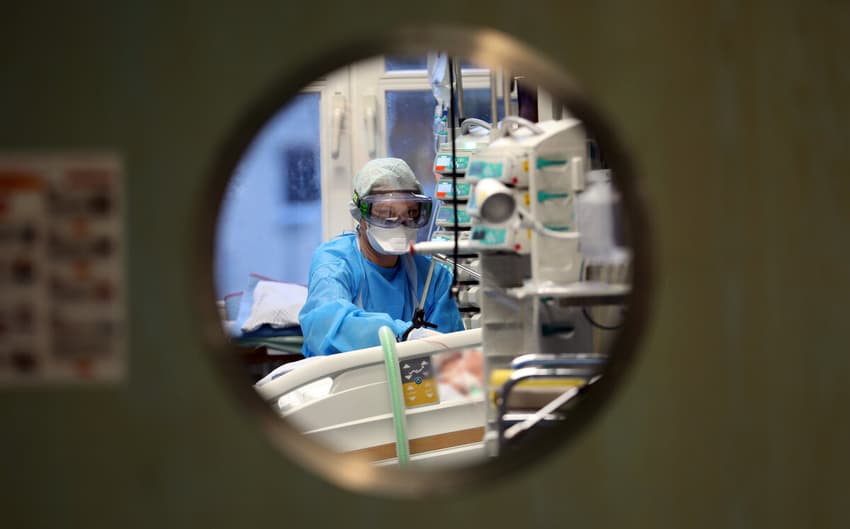German doctors call on government to end 'irresponsible' easing of lockdown as virus spread accelerates

The heads of several German doctors associations have warned the German government that, if it does not row back on lockdown easings now, the country's health care system will be put under extreme strain for the third time in a year.
"The agreed 'emergency brake' certainly needs to be pulled, there can be no exceptions," said Susanne Johna, head of the Marburger Bund doctors' association.
The emergency brake is a clause in the lockdown agreement from March 3rd which commits states and regions to going back into a hard lockdown if the 7-day incidence stays above 100 for three days in a row.
The 7-day incidence now stand perilously close to the 100 barrier. On Saturday morning the Robert Koch Institute confirmed that it had risen to 99.9 cases per 100,000 inhabitants nationwide.
READ MORE: Germany warns of ‘exponential’ coronavirus spread
"I expect the situation to be even more critical at Easter than it was at the turn of the year," Johna said, adding that the capacity buffer in intensive care units "will melt away rapidly."
"It was irresponsible to lift restrictions in this way as we entered a the third wave with the spread of mutant strains. As a result, the clinics are now threatened with the third extreme situation within a year," Johna said.
Gernot Marx of the Association for Intensive Care and Emergency Medicine said that "from our point of view, there can only be a return to the lockdown of February."
"Everything you allow yourself to do now, you will have to pay for later with interest and more interest," Marx warned.
Eight German states, including Bavaria, Hamburg and North Rhine-Westphalia, now have seven-day incidences above 100. But Hamburg is the only state to have announced so far that it is taking back restrictions that had started this month.
On Friday evening, Chancellor Angela Merkel hinted that a nationwide return to a hard lockdown could be imminent.
"Unfortunately, we will have to make use of the emergency brake," she said after ending a round of consultations with the state leaders on how to proceed with Germany's vaccination rollout.
"I would have liked us to get along without the emergency brake, but, when I look at the developments of the last few days, that won't be possible," she said.
Health offices reported 16,033 new coronavirus infections to the RKI on Saturday morning. There were also 207 new coronavirus-related deaths reported within 24 hours.
On Saturday last week, the RKI registered 12,674 new cases and 239 new deaths within one day.
SEE ALSO: Here’s the German vocabulary you need to get the Covid-19 vaccine
Comments
See Also
"The agreed 'emergency brake' certainly needs to be pulled, there can be no exceptions," said Susanne Johna, head of the Marburger Bund doctors' association.
The emergency brake is a clause in the lockdown agreement from March 3rd which commits states and regions to going back into a hard lockdown if the 7-day incidence stays above 100 for three days in a row.
The 7-day incidence now stand perilously close to the 100 barrier. On Saturday morning the Robert Koch Institute confirmed that it had risen to 99.9 cases per 100,000 inhabitants nationwide.
READ MORE: Germany warns of ‘exponential’ coronavirus spread
"I expect the situation to be even more critical at Easter than it was at the turn of the year," Johna said, adding that the capacity buffer in intensive care units "will melt away rapidly."
"It was irresponsible to lift restrictions in this way as we entered a the third wave with the spread of mutant strains. As a result, the clinics are now threatened with the third extreme situation within a year," Johna said.
Gernot Marx of the Association for Intensive Care and Emergency Medicine said that "from our point of view, there can only be a return to the lockdown of February."
"Everything you allow yourself to do now, you will have to pay for later with interest and more interest," Marx warned.
Eight German states, including Bavaria, Hamburg and North Rhine-Westphalia, now have seven-day incidences above 100. But Hamburg is the only state to have announced so far that it is taking back restrictions that had started this month.
On Friday evening, Chancellor Angela Merkel hinted that a nationwide return to a hard lockdown could be imminent.
"Unfortunately, we will have to make use of the emergency brake," she said after ending a round of consultations with the state leaders on how to proceed with Germany's vaccination rollout.
"I would have liked us to get along without the emergency brake, but, when I look at the developments of the last few days, that won't be possible," she said.
Health offices reported 16,033 new coronavirus infections to the RKI on Saturday morning. There were also 207 new coronavirus-related deaths reported within 24 hours.
On Saturday last week, the RKI registered 12,674 new cases and 239 new deaths within one day.
SEE ALSO: Here’s the German vocabulary you need to get the Covid-19 vaccine
Join the conversation in our comments section below. Share your own views and experience and if you have a question or suggestion for our journalists then email us at [email protected].
Please keep comments civil, constructive and on topic – and make sure to read our terms of use before getting involved.
Please log in here to leave a comment.